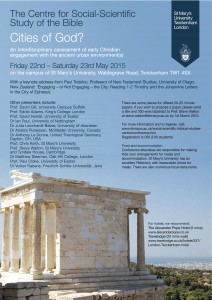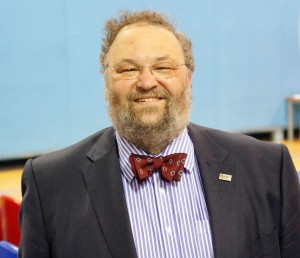There’s still time to register for our ‘Cities of God?’ conference at St Mary’s
There’s only a week to go until the ‘Cities of God?’ conference on Friday 22 and Saturday 23 May, and you still have time to register! We’re organising this exciting conference, bringing together Classicists, New Testament scholars and Human Geographers to look at early Christian engagement with and reflection about cities at St Mary’s University, Twickenham (London) as part of our Centre for the Social-Scientific Study of the Bible. There is still some space to register, so don’t miss out! The programme and paper abstracts are available, and the line-up of speakers is mouth-watering!
Here’s my excellent colleague Chris Keith on some of the papers he’s looking forward to hear:
In anticipation, I thought I’d say a bit about a few of the papers I’m most looking forward to hearing (not counting my own and Steve Walton’s, of course). I’m really looking forward to Paul Trebilco’s “Engaging—or Not Engaging—the City: Reading 1 and 2 Timothy and the Johannine Letters in the City of Ephesus.” This is the keynote lecture and for a good reason. Trebilco is the world’s leading scholar on Ephesus, at least among NT scholars, and we are thrilled that he’s bringing his learning on this topic to the conference.
After hearing the world’s leading NT scholar on Ephesus, I’m looking forward to hearing David Horrell, the world’s leading NT scholar on 1 Peter and author of probably the single best introduction to Pauline studies in existence. His paper is “Placing 1 Peter: Proposed Locations and Constructions of Space.” Also coming from Exeter and speaking on space in 1 Peter is Wei-Hsien Wan, who’s presenting “The Making of Social Vertigo: Spatial Production and Non-belonging in 1 Peter.” I suspect these will be strongly social-scientific studies and I’m very interested. I’m interested because of my work in social memory theory. An unfortunate by-product of the “memory and historical Jesus” stuff has been that social memory theory’s ability to speak to more issues has been overshadowed. Maurice Halbwachs worked out his original ideas in reference to space and topography, though, in addition to other things, and produced a fascinating study on how crusaders re-discovered various famous places from the Gospels in different historical periods, basically re-arranging the topography of the Holy Land in each stage. Social-scientific approaches to space have, I think, much promise for NT studies so these studies should be excellent.
I’m also looking forward to two papers on Jerusalem for much the same reasons: Anders Runesson’s “Jerusalem according to Matthew: The Sacred City of God” and Anthony Le Donne’s “Both Jews and Judeans: Claiming Jerusalem as Polysemy in Urban, Rural, and Diaspora Settings.” Although I’m disappointed not to hear Runesson (recently appointed Professor of NT at Oslo) on synagogues, I’m glad that he’ll be extending some of his work on Matthew. Le Donne’s paper promises to be an exciting contribution to the discussion of whether to translate Ioudaios as “Jew” or “Judean.” That discussion recently blew up afresh after an article from Adele Reinhartz on Marginalia.
Of course, I’m anxious to hear all the papers. My colleague, Prof Steve Walton, has served as the main organizer for the conference and put together a wonderful group of speakers. Please join us here in London, and especially for the wonderful dinner at La Dolce Vita Italian restaurant on Friday night. But make sure to register so we know the numbers. There are a few days left!

